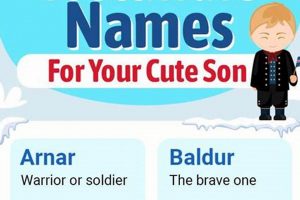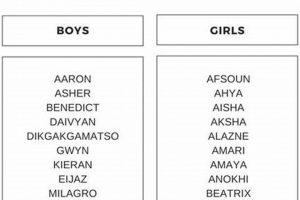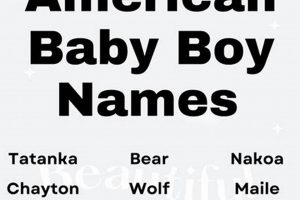Selecting a designation for a newborn is a significant decision for parents. This process often involves consideration of various sources of inspiration, ranging from family heritage to popular culture. One increasingly prevalent trend in nomenclature is drawing inspiration from the vast universe of comic books and associated media, in particular, the expansive narratives and characters originating from a renowned comic book publisher. This option presents a way to imbue a child’s identity with characteristics associated with bravery, intelligence, or unique abilities. For example, a parent might choose “Peter,” referencing a well-known hero known for his intellect and responsibility.
The adoption of monikers inspired by these fictional worlds offers several advantages. It allows parents to express their personal interests and passions, creating a potential connection point with their child as they grow. Furthermore, such selections can convey positive attributes, associating the child with the admirable qualities of the character. Historically, names derived from mythology and literature have been popular, and this trend can be viewed as a modern evolution, reflecting the influence of contemporary storytelling on cultural practices.
The following sections will explore various options influenced by characters, locations, and concepts from this specific comic book realm, providing detailed information to assist parents in making informed and meaningful choices. Considerations will include the origin, meaning, and potential connotations associated with each chosen designation, ensuring a comprehensive understanding of its suitability.
Tips for Selecting Nomenclature Inspired by Marvel Comics
Choosing a designation from the Marvel universe requires careful consideration. The following tips offer guidance in making an informed and appropriate selection.
Tip 1: Research the Character’s History: Thoroughly investigate the character’s background, including their origins, powers, and significant storylines. A name might seem appealing initially, but a deeper understanding could reveal negative associations or complexities.
Tip 2: Consider the Meaning and Connotation: Evaluate the inherent meaning of the name itself, as well as any cultural or historical connotations. Some designations carry specific meanings that may or may not align with parental values.
Tip 3: Assess the Pronunciation and Spelling: Ensure the chosen designation is easily pronounceable and correctly spelled. This prevents potential confusion and misinterpretations throughout the child’s life.
Tip 4: Evaluate Gender Neutrality (If Desired): If seeking a non-gender-specific option, carefully assess its perceived gender association. Some selections, while originally intended for one gender, may be suitable for either.
Tip 5: Think Long-Term: Envision how the designation will be perceived throughout the child’s life, from infancy to adulthood. A choice that seems fitting for a baby may not be as suitable for a professional adult.
Tip 6: Consider the Full Name: Carefully evaluate how the selection sounds and appears when combined with the surname. The flow and overall aesthetic of the complete name are crucial considerations.
Adhering to these suggestions enables a more thoughtful and informed decision. The objective is to select a designation that not only reflects parental interests but also serves the child well throughout their life.
The subsequent segments will delve into specific examples of popular and less common possibilities, providing further insight into the selection process.
1. Character Origins
The origin of a fictional character within the Marvel universe provides critical context when considering designations drawn from that source. The character’s history, encompassing their motivations, moral alignment, and significant relationships, significantly influences the connotations associated with their designation. Therefore, a comprehensive understanding of character origins is paramount in the decision-making process.
- Narrative Arc
The narrative arc of a character, detailing their evolution from inception to the present, shapes public perception. A character initially portrayed as heroic may undergo a transformation, exhibiting moral ambiguity or outright villainy. Designations linked to such figures carry the weight of this evolution. For instance, a name derived from a character initially portrayed as a villain who later becomes an anti-hero may hold connotations of both darkness and redemption, influencing how others perceive the designation.
- Source Material Consistency
Characters frequently appear across various media, including comic books, films, and television series. However, interpretations may differ significantly between these platforms. It is essential to consider the specific source material that serves as the primary point of reference. For example, a character depicted as lighthearted in a film adaptation may have a far more complex and somber portrayal in the original comic books. Consequently, the designation’s associated qualities can vary depending on the chosen source material.
- Cultural Context
The cultural context in which a character was created and the cultural impact they have had are also vital. A character created during a specific social movement or reflecting certain cultural values carries those influences with them. A name that was initially created for a male character, but gains popularity on a female character overtime. It could gain new perspective and values. It can be an important element for parents in making the choice.
- Power and Abilities
The powers and abilities attributed to a character often become intrinsically linked to their designation. Names associated with characters possessing extraordinary capabilities, such as super strength, telepathy, or mastery of technology, may evoke a sense of empowerment or exceptional potential. However, associating a designation with specific abilities can also create expectations or comparisons that may not be desirable.
A thorough examination of character origins provides valuable insights into the nuances and potential implications of adopting a designation derived from the Marvel universe. This due diligence ensures that the chosen designation aligns with the parents’ intentions and resonates with the desired qualities they wish to associate with their child.
2. Name Meaning
The inherent meaning of a designation carries substantial weight, influencing both conscious and subconscious perceptions. In the context of marvel baby names, this significance is amplified by the pre-existing associations individuals hold with specific characters. The etymological roots and historical usage of a designation can subtly shape expectations and impressions, independent of the fictional persona attached to it. For example, the name “Gwen” is often associated with purity and fairness, characteristics that may be desirable even when inspired by a character in the Marvel universe. Therefore, parents must consider both the fictional character and the inherent significance of the selection to ensure that the designation aligns with their aspirations for the child.
Practical application of this understanding necessitates research beyond the character’s narrative. Consulting etymological dictionaries and name databases provides insight into the designation’s origin and cultural connotations. Furthermore, examining how the designation has been historically used within different societies offers a broader perspective. For instance, a name with positive connotations in one culture might have negative associations in another. An example is the name “Victor”, which etymologically signifies “conqueror”, offering connotations of triumph. However, when choosing “Victor” to celebrate the marvel character, “Victor Von Doom”, there may be other meanings considered.
In conclusion, the connection between the meaning of a designation and choices inspired by the marvel universe highlights the importance of comprehensive evaluation. While the character’s traits undoubtedly influence the perception, the designation’s inherent significance plays a crucial role in shaping its overall impact. Parents must carefully weigh both factors to ensure that the selection resonates with their values and conveys the intended message, navigating potential challenges of negative associations and aligning their hopes for the child with the designation’s inherent properties.
3. Popularity Trends
The prevalence of specific designations within a given period directly impacts the perception and uniqueness of those associated with them. The adoption of designations originating from Marvel Comics is subject to these fluctuations. A name initially considered distinctive can become commonplace due to widespread adoption following a popular film release or character resurgence. This shift in popularity can dilute the intended sense of individuality. For example, names like “Loki” and “Quinn” have seen increased usage following the success of associated media, potentially diminishing their perceived uniqueness. Therefore, understanding popularity trends is a crucial consideration when selecting a designation from the Marvel universe.
Tracking these trends requires awareness of popular culture and monitoring designation databases. Websites and resources dedicated to nomenclature provide insights into the current ranking and historical usage of designations. Furthermore, following media coverage of character portrayals and analyzing social media discussions can offer clues to emerging trends. For instance, an upswing in online conversations surrounding a particular character may indicate a subsequent rise in the popularity of their designation. The practical application of this knowledge allows parents to make informed decisions, avoiding selections that may become overly common while identifying less frequently used options that still resonate with their desired qualities.
In conclusion, popularity trends exert a significant influence on the impact and perceived distinctiveness of marvel baby names. Remaining informed about these fluctuations enables parents to navigate the landscape effectively, balancing their personal preferences with the desire for a designation that is both meaningful and relatively uncommon. The challenge lies in predicting future trends, but by carefully monitoring cultural currents and designation databases, parents can make well-informed choices. This understanding contributes to the broader goal of selecting a designation that is both personally significant and appropriate for the child’s individual identity.
4. Sound and Flow
The auditory characteristics of a designation, encompassing its rhythm, cadence, and phonetic harmony, constitute the elements of sound and flow. In the context of marvel baby names, these considerations acquire heightened significance. The aesthetic appeal of a designation, irrespective of its association with a fictional character, contributes to its overall suitability. Designations that are easily pronounceable, possess a pleasing sonic quality, and integrate seamlessly with the surname are generally more desirable. The euphony of the designation impacts its memorability and the ease with which it is articulated, factors directly influencing social interactions and personal identity. A designation that is phonetically awkward or creates an undesirable auditory effect can lead to mispronunciations, confusion, or even negative perceptions, irrespective of its origin or intended meaning.
The selection process should incorporate a deliberate assessment of the auditory compatibility of the designation with the surname. Experimenting with different combinations and verbally articulating the full designation allows for evaluation of its rhythmic flow and phonetic coherence. For example, a designation with a monosyllabic structure may pair effectively with a polysyllabic surname, creating a balanced and pleasing auditory effect. Conversely, a designation and surname with similar phonetic patterns or rhythmic structures may result in an awkward or repetitive sound. Considering the phonetic qualities of given designations, such as alliteration, assonance, and consonance, contributes to a more refined selection. A well-chosen selection reflects careful attention to both the aesthetic and functional dimensions of the spoken word.
In summary, sound and flow constitute an essential aspect of selecting marvel baby names. The auditory properties of a designation contribute significantly to its overall appeal and suitability. Evaluating the phonetic harmony, rhythmic balance, and ease of articulation is crucial for ensuring a positive and enduring impact. A designation that is both meaningful and aesthetically pleasing enhances the child’s individual identity and facilitates positive social interactions. While the association with a fictional character provides the initial inspiration, the auditory dimensions ultimately determine the designation’s long-term suitability and impact.
5. Character Associations
Character associations represent a fundamental consideration within the realm of marvel baby names. These associations arise from the inherent qualities, narrative roles, and public perception of characters originating from Marvel Comics and related media. The selection of a designation linked to a particular character inevitably invokes these pre-existing associations, influencing how the child is perceived by others and potentially impacting their own self-image. Therefore, comprehending the nuances of character associations is essential for parents seeking designations inspired by the Marvel universe.
The significance of character associations stems from their pervasive influence on societal perceptions. Designations linked to heroic characters may evoke feelings of admiration and respect, while those associated with villainous figures can elicit suspicion or unease. For example, a designation derived from a character known for their intelligence and strategic thinking may lead others to perceive the child as intellectually gifted, whether or not this aligns with their actual abilities. Conversely, a designation originating from a character with a tragic backstory could inadvertently invite unwanted scrutiny or pity. The impact of these associations is not limited to external perceptions. Children may internalize the characteristics and attributes associated with their designation, shaping their behavior and self-concept. A child designated with the name of a powerful, self-assured character may develop a greater sense of confidence, while one named after a character struggling with internal conflicts could experience heightened anxiety or insecurity. A well-known example is the name “Erik,” derived from Erik Lehnsherr (Magneto), which elicits associations with power and rebellion, but also with trauma and moral complexity.
In conclusion, the interplay between character associations and marvel baby names underscores the importance of careful deliberation. The selection of a designation invariably links the child to a pre-existing network of perceptions and expectations, influencing both external interactions and internal development. Recognizing the potential impact of these associations enables parents to make informed choices, selecting designations that align with their values and promote the well-being of their child. The challenge lies in anticipating the long-term impact of these associations, as characters and their portrayals evolve over time. However, by considering the multifaceted nature of character associations, parents can navigate the selection process with greater awareness and purpose.
Frequently Asked Questions
The following section addresses common inquiries regarding the selection of designations inspired by the Marvel Comics universe, offering guidance and clarifying potential concerns.
Question 1: Is it appropriate to designate a child with the name of a villainous character?
The appropriateness of such a designation is subjective and contingent upon individual values. While villainous characters often possess negative traits, they may also exhibit compelling complexities or undergo redemptive arcs. Careful consideration should be given to the specific character’s backstory, motivations, and overall impact on the narrative.
Question 2: How can potential negative connotations associated with a Marvel designation be mitigated?
Mitigation strategies include pairing the Marvel designation with a more traditional middle name or emphasizing the positive qualities of the character during discussions about the designation’s origin. Openly addressing any potential concerns can preemptively dispel misconceptions.
Question 3: Should the popularity of a Marvel designation influence the selection process?
The influence of popularity is a matter of personal preference. While a unique designation may offer a sense of individuality, a more common designation may facilitate social integration. Parents should weigh these competing factors based on their priorities.
Question 4: What resources are available for researching the origins and meanings of Marvel designations?
Numerous online resources provide information regarding designation etymology and Marvel character biographies. Etymological dictionaries, Marvel Comics databases, and fan-created wikis can offer valuable insights.
Question 5: Is it necessary to be a fan of Marvel Comics to select a Marvel-inspired designation?
Familiarity with the source material is recommended but not mandatory. Parents should thoroughly research the character and designation, regardless of their prior knowledge of the Marvel universe.
Question 6: How should potential mispronunciations of uncommon Marvel designations be addressed?
Clear and concise pronunciation guidance should be provided to friends, family, and acquaintances. Correcting mispronunciations politely and consistently can prevent future errors.
The selection of a marvel baby name necessitates careful consideration of diverse factors, ranging from character associations to etymological origins. Informed decision-making is essential for ensuring a positive and meaningful outcome.
The subsequent section will provide a detailed compendium of possible designations, categorized by gender and thematic relevance.
Marvel Baby Names
The exploration of naming practices drawn from the Marvel universe underscores a critical intersection of popular culture and personal identity. This analysis has highlighted the importance of considering character origins, designation meanings, popularity trends, auditory qualities, and character associations. A thorough evaluation of these factors is essential for ensuring that the selected designation aligns with parental values and fosters a positive sense of self for the child.
The practice of selecting from marvel baby names reflects a broader cultural phenomenon: the increasing influence of fictional narratives on real-world decision-making. As storytelling continues to shape societal norms and individual aspirations, the responsible and informed selection of designations remains paramount. Parents are encouraged to engage in thoughtful deliberation, recognizing the enduring impact that a designation can have on a child’s life.




![Unique Country Baby Boy Names + Ideas [2024 Trends] Baby Care 101: Essential Tips for Happy, Healthy Babies Unique Country Baby Boy Names + Ideas [2024 Trends] | Baby Care 101: Essential Tips for Happy, Healthy Babies](https://singlebabies.com/wp-content/uploads/2026/01/th-831-300x200.jpg)


